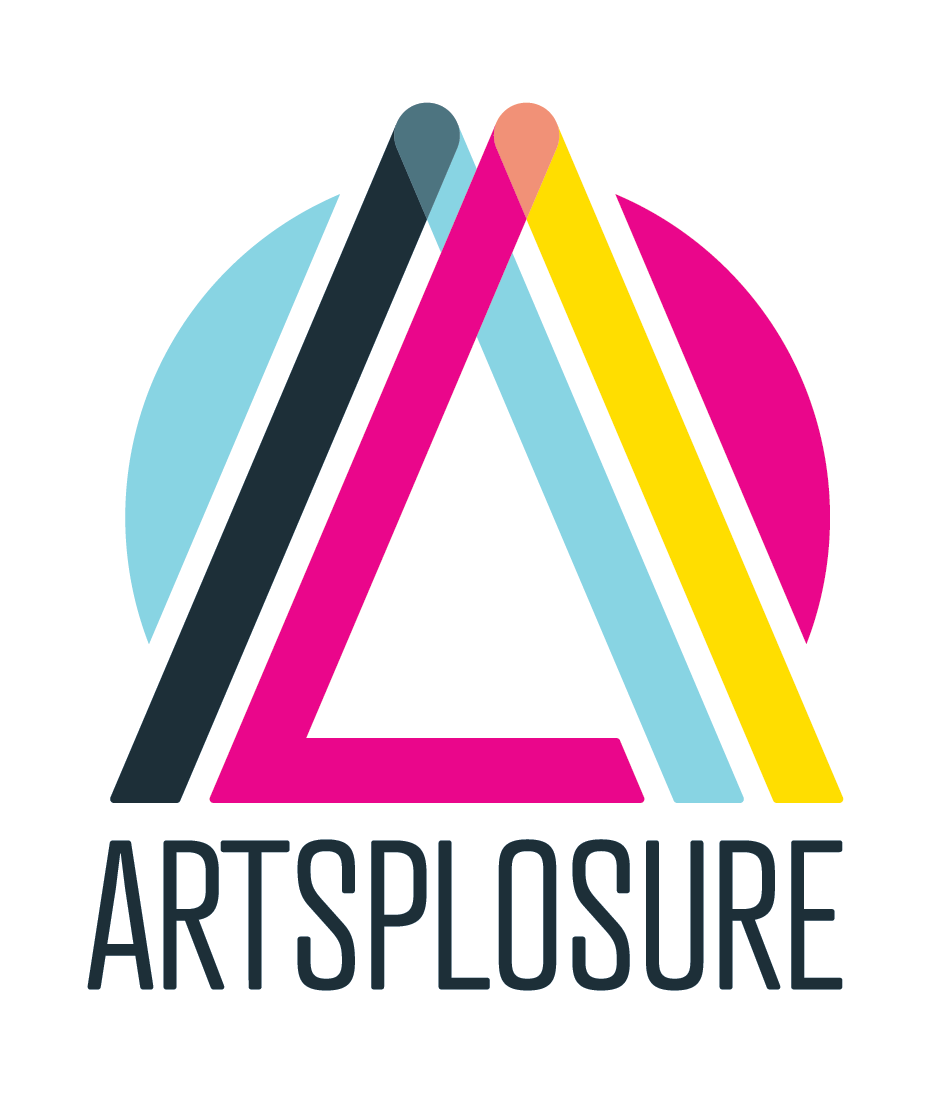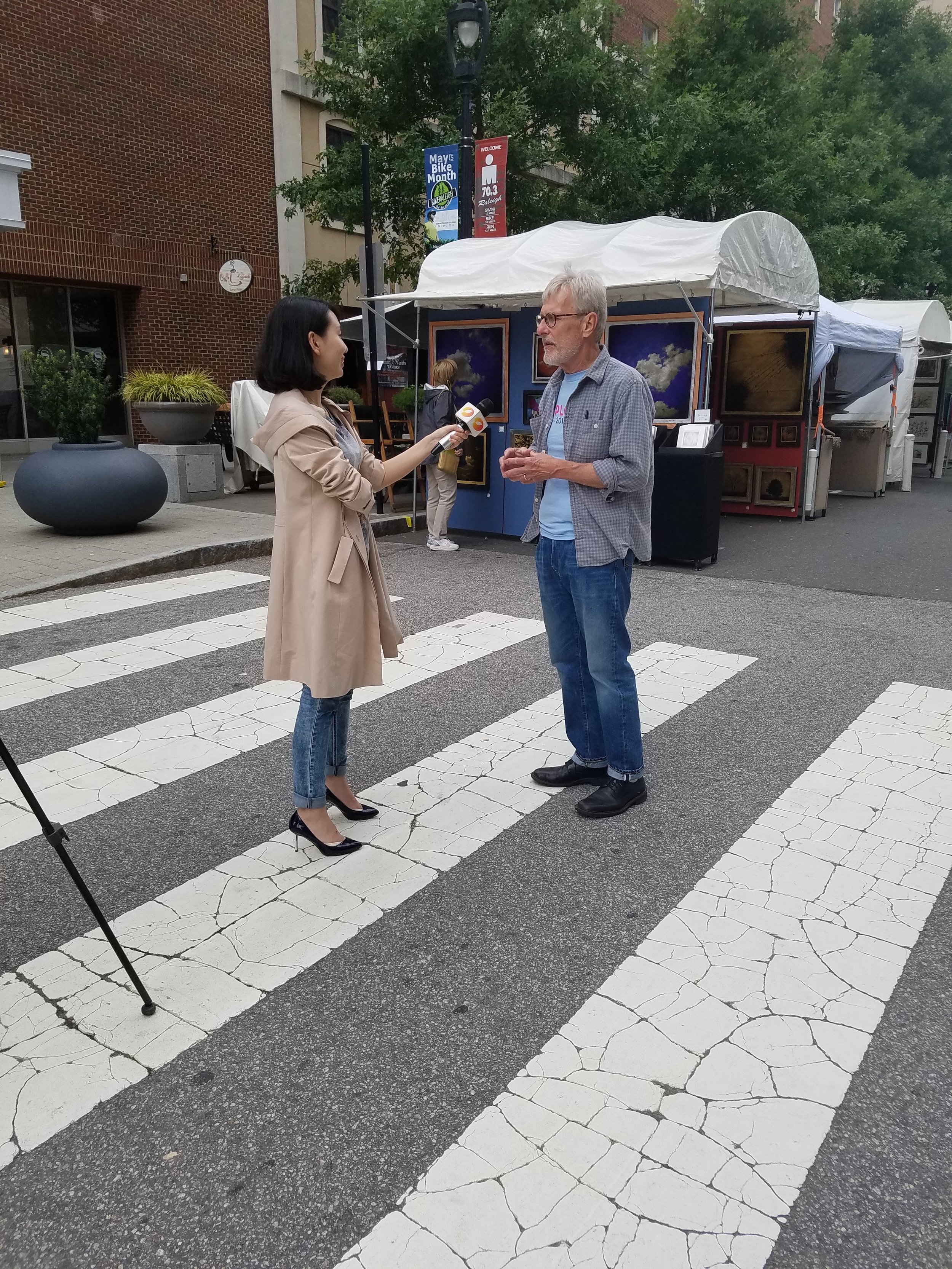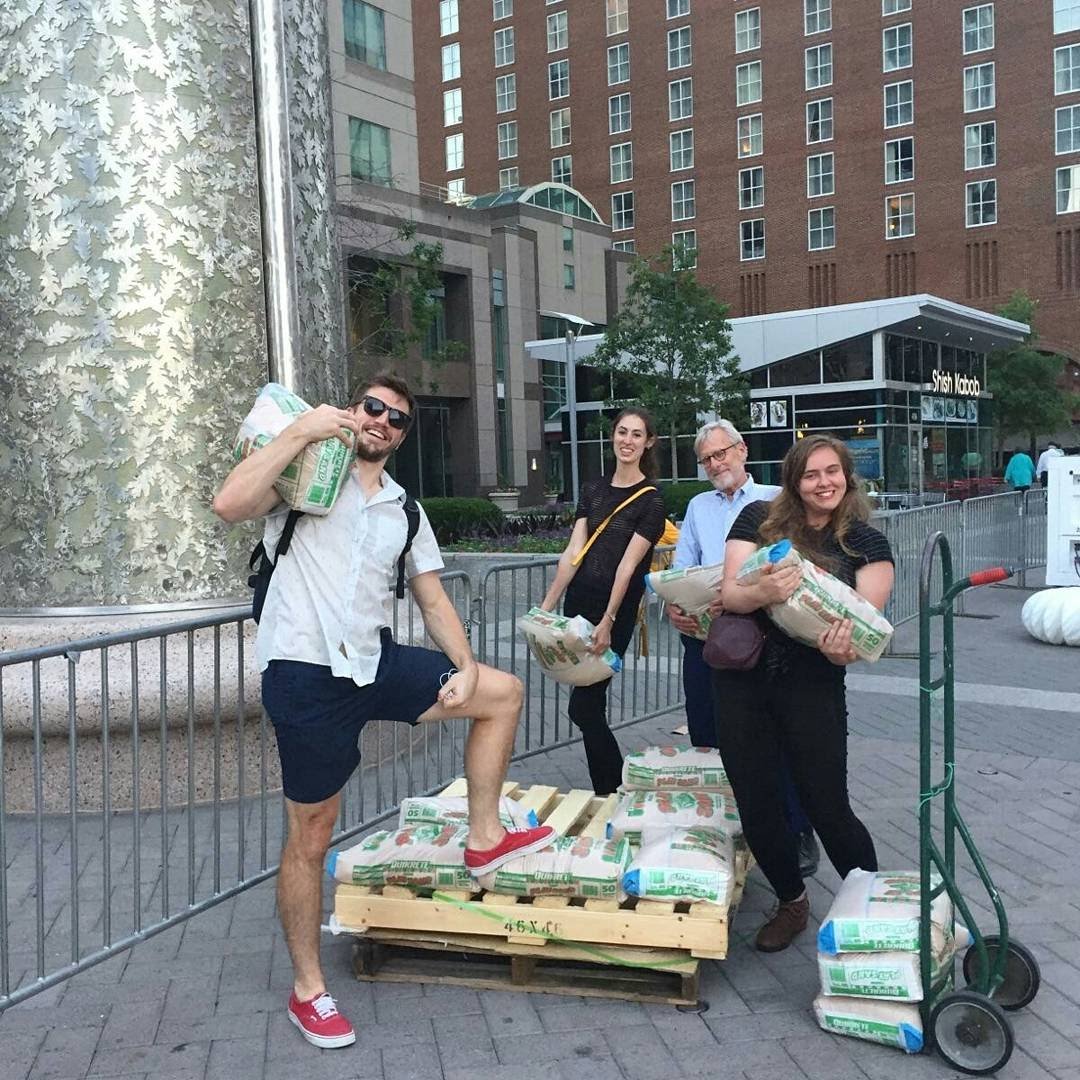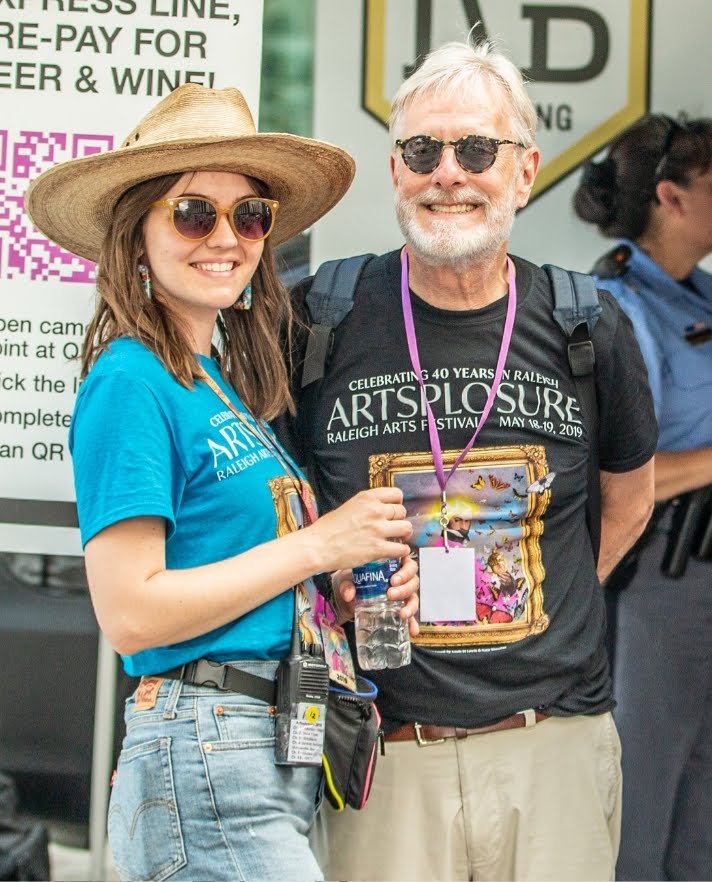Michael Lowder Retires as Executive Director of Artsplosure
Michael Lowder led the arts festival presenter for nearly 25 years. He was initially recruited for the position to ensure that Artsplosure exceeded community and civic leadership expectations after the nonprofit agency had committed to planning and producing a comprehensive program to mark the new Millennium. Although some Millennium program planning had already taken place, the financial resources needed to underwrite a meaningful and impactful celebration had not been secured. Lowder amassed 20 years of grants seeking and fundraising experience when he accepted the job offer in November 1997, and this task became his immediate priority. He refocused his inherited staff and hired two contractors to assist with planning: Linda Bamford to focus on arts education initiatives and Terri Dollar to develop inclusive programming.
The r2K Millennium Celebration, which began with a 99-day countdown that culminated at First Night Raleigh on December 31, 1999, was a critical and crowd-pleasing success. Among its most visible legacies is the Gyre sculpture on the grounds of the NC Museum of Art. The creation of this artwork was one of several r2K artist-in-the-schools initiatives, which teamed local sculptor Thomas Sayre with art students at Enloe High School. Lowder made sure that all the r2K engagement projects touched the lives of people from all walks of life and economic circumstances.
He began his arts management career in 1978 when Dr. Lawrence J. Wheeler, who was Deputy Secretary of NC Department of Cultural Resources, used a National Endowment for the Humanities Chairman’s Discretionary Grant to hire him to be the program director for the newly formed Governor’s Business Council on the Arts and Humanities. The members of the Council were a who’s who of the state’s philanthropic leadership, including Gordon and Phil Hanes, Mary D.B.T. and Dr. Jim Semans, and William A.V. Cecil. Lowder organized conferences and workshops in Asheville, Winston-Salem, Greenville, and Wilmington, conducted and published economic impact research, and created and managed a statewide awards program for exemplary service to the arts and humanities.
Dr. John T. Caldwell, the retired Chancellor at NC State University and a member of Lowder’s graduate school committee, helped launch his arts administration career. In late 1977, after Lowder received his MPA degree (with a minor in Adult Education), Caldwell introduced him to arts leaders at NC State and in state government, which finally led to interviewing with Wheeler. In order for Wheeler to receive permission from Governor Jim Hunt’s patronage office to hire Lowder, Dr. Oliver Williams, another one of Lowder’s professors and a member of the Raleigh City Council, called the patronage office director to assure him that Lowder was a “good Democrat.” So pervasive was the Hunt patronage office, even the office of Greensboro Congressman L. Richardson Preyer had to write a letter in support of Lowder’s employment, all for an $11,000/year grant-supported position that would be terminated in three years!
While at DCR, Lowder started life-long friendships with George Holt, who founded the Office of Folklife Programs and who later ran the NC Museum of Art’s performing arts programs, and with Wayne Martin, who recently retired as Executive Director of the NC Arts Council. Over the years, many of his closest professional and personal friends were employed by the NC Arts Council.
Lowder cites Larry Wheeler as one of his two staff management role models. The other is Dr. Thomas H. McGuire, Jr. McGuire hired Lowder as the NC Symphony’s Director of Marketing and Audience Development in 1983. Both men brought out the best in him and other self-motivated staff members by employing a laissez-faire/democratic management style, which Lowder employed with much success during the tenure at Artsplosure. While enrolled in the MPA program, Lowder became deeply interested in organizational theory.
Prior to his NC Symphony stint, Lowder briefly bartended at the legendary Cameron Village Underground music club, The Pier. He loved to tell the staff war stories from this time in his life.
At the Symphony, he was responsible for the Raleigh concert series subscription drive, the Raleigh chapter of the Symphony Society, all contract sales, the annual fund drive, the statewide Friends of the Symphony, and marketing and sales campaign materials for Raleigh and the Symphony’s once extensive chapter network. He is most proud of booking the orchestra in Charlotte, much to the displeasure of the rival Charlotte Symphony. He created the initial marketing campaign for Summerfest at Koka Booth Amphitheatre in Cary and organized the first New Year’s Eve gala fundraising event. Among the many guest artists he met, Chick Correa is the most memorable. He once suggested to music director/conductor Gerhardt Zimmermann that he consider bringing Winton Marsalis to perform with the orchestra. Gerhardt asked, “who’s that?” He also skipped his first concert as an employee to go see The Clash at William & Mary.
The staff will miss Michael’s passion for music and impromptu jam sessions.
At this time, he joined the board of directors of The Creative Exchange, an arts education nonprofit. He rose to become board president, and along with his dynamic executive committee (Marilyn Harrison, Parker Call, Roberta Mazer, and Travis Tracy), he led efforts to evolve the organization into a full fledged arts council, much like ones found in Winston-Salem, Charlotte, and Greensboro. The organization rebranded itself the Wake County Arts Council, which later merged with the Raleigh Arts Foundation to become United Arts Council of Raleigh and Wake County.
Several years later, he became involved with ARTVU, a North Carolina-centric visual arts criticism publication that was the brainchild of Dennis Szakacs. Lowder served as treasurer of the board of directors. Except for Lowder, the board was comprised of art museum directors, curators, and university art department faculty members. As a painter and photographer, Lowder had preexisting relationships with several of them, including Jane Kessler, the chief curator at the Mint Museum of Art in Charlotte. (One of Lowder’s acrylic, hard edge paintings had been selected for the Mint’s Southeastern Biennial Exhibition in 1977.) After Szakacs left his marketing position at SECCA in Winston-Salem for a museum job in New York City, Lowder became the magazine’s de facto publisher. Szakacs later became director of the Orange County (CA) Museum of Art.
After leaving the Symphony, he briefly worked for FGI, a start-up marketing services firm in Chapel Hill, as an account executive. FGI’s co-founders were Jim Protzman and Steve Lerner. He landed a significant client for the firm -- the U.S. Olympic Festival -’87 -- and soon left FGI to work directly for Hill Carrow, the mastermind behind bringing this national sports festival to the Triangle, and Carrow’s development chief Beth Briggs. Lowder was charged with planning, organizing, and fundraising on behalf of a complimentary art and cultural program, which has been Lowder’s more challenging and stressful assignment during his career. The subsequent A North Carolina Arts Celebration remains the state’s largest regional arts festival. Along with commissioning new works in contemporary music, opera, and sculpture (Doug Hollis’ “Wolf Ears” installation on the NC State campus), Lowder produced the inaugural Bull City Blues Festival and oversaw the competition to create the official poster, which acclaimed North Carolina artist Maude Gatewood won. The overall impact of the U.S. Olympic Festival on the Triangle reverberates to this day. (Lowder is currently serving on the Bid Committee to bring the World University Games to North Carolina in 2027, which is another Carrow-led initiative.)
In late 1987, he accepted the position of Director of Finance and Development with the United Arts Council of Greensboro (now ArtsGreensboro). For three years, he organized and managed the Council’s United Fund for Arts, a comprehensive fundraising campaign modeled on successful-at-the-time United Way campaigns. Along with soliciting large corporations, small businesses, local foundations, and wealthy families, the campaign encompassed peer-to-peer professional divisions, telephone banks, personalized and direct mail, and employee payroll deduction programs. The campaign brought in around $700,000, which is the equivalent of $1,672,000 today. He managed the grants-making program that redistributed the bulk of annual campaign funds to local arts organizations. He prepared and monitored the annual operating budget and provided as-needed support for City Stage, the council’s annual arts festival. He reported to President and CEO Helen Snow, from whom Lowder learned much about team management and staff motivation. After Artsplosure, the Greensboro Arts Council position was his most professionally rewarding and enjoyable. He met his future wife Sarah there!
He was recruited by friend and fundraising consultant David Winslow to move over to The Arts Council of Winston-Salem/Forsyth County as Vice President for Development in 1991. The Winston-Salem Arts Council led the nation in per capita fundraising for the arts. Because it was the home of the oldest community arts council in the nation and NC School of the Arts, Winston-Salem had rebranded itself as the “City of the Arts” during the 1970s under the dynamic leadership of Art Council President Milton Rhodes. Although Lowder never had the opportunity to work for Rhodes, he greatly admired Rhodes’ many achievements and style. Rhodes was equally comfortable in a corporate boardroom and in an artist’s studio. Unfortunately for his successors, Rhodes’s shadow was so large that their terms leading the organization were considered disappointments. Lowder’s supervisor was President and CEO David Hudson. Hudson did not enjoy interacting with many of the Council’s constituencies. As a result, Lowder served as the face of the Arts Council to the corporate community, fund drive volunteers, and the many recipients of annual grants. Lowder’s two campaigns raised $1,700,000+ each, which is the equivalent of $3,697,000 in 2022 dollars. For perspective, this is twice as much as the City of Raleigh Arts Commission distributes in grants each year in 2022. He managed a seven-person staff and five loaned executives in order to plan and manage this complex campaign. He also oversaw all of the Arts Council’s grants programs (operating, project, arts education, emerging artist, new initiatives).
During this time, he was recruited by the Duke University Certificate Program in Nonprofit Management to teach short courses in marketing and fundraising as part of Certificate Program’s Triad area expansion.
In 1993, he began a four relationship with Capital Consortium (now Capital Development Services), which offered consulting services to nonprofits in North Carolina and neighboring states. The firm’s principal owner and co-founder was John Bennett, who Lowder had first met when he was with the Department of Cultural Resources. As the director of plans and studies, he designed, oversaw, and/or conducted the firm’s analytical projects, including capital and annual campaign feasibility studies, organizational assessments, and case for support development. He also provided ongoing campaign counsel and conducted numerous executive staff searches. Among his most high profile clients were Peace College, NC Museum of Natural Sciences, NC Museum of Art, Southern Environmental Law Center, Virginia Methodist Home for Children, NC Partnership for Children/Smart Start, NC Community College System, Graveyard of Atlantic Museum, and Roanoke Island Historical Association/The Lost Colony. (He fell in love with Manteo and the Outer Banks because of his experiences there.) The extensive body of work he created while with Capital Consortium remains the firm’s core diagnosis and planning resource.
In late summer 1997, nonprofit consultant Beth Briggs contacted Lowder about the vacant Artsplosure position. Lowder and Briggs had been professional friends since the early 1980s. Lowder reported to Briggs when he was working for the U.S. Olympic Festival -’87, and Briggs was a co-founder of Capital Consortium. (Lowder had been offered the Artsplosure job in the early 1980s, but he turned it down to pursue working for the NC Symphony.) Within a year or two, Lowder realized that leading Artsplosure was his dream job. Like community arts councils, Artsplosure’s “Art for All” mission aligned perfectly with his belief system, education, and avocational interests. (Lowder had seriously pursued his artistic interests -- painting, printmaking, and film photography -- prior to enrolling in the MPA program and had continued to create art after he entered the professional workforce.)
Early in his time at Artsplosure, Lowder was asked to teach a course in nonprofit management and fundraising in NC State’s MPA program. His course was offered every other year for six years.
Artsplosure’s complicated and evolving relationship with the City of Raleigh has done much to define Lowder’s 25-year tenure. In 2004, as the Fayetteville Street Mall was being demolished, Lowder authored the concept paper and work plan used to develop the “Downtown Events Task Force." The plan’s year-round programming recommendations, which were developed by Terri Dollar, became a template for the explosion of downtown events. A few years later, Lowder launched a successful fundraising campaign to underwrite several new festival concepts to showcase the Duke Energy Center for the Performing Arts and enliven its outdoor plaza. Real estate developer Harold Lichtin, for whom the outdoor plaza had been named, spearheaded this effort. The new festivals were the "Capital Holiday Arts Celebration," "Puppet Fusion," "Art on the Edge," and “Art Raleigh.” All of these festivals featured cutting-edge work only seen in larger cities. In 2008, Lowder took on one of his most challenging and politically-charged assignments when Artsplosure was recruited by City and Wake County officials to help plan a festival celebrating African American art and culture. From 2010 to 2013, Artsplosure served as the behind-the-scenes presenter of the African American Cultural Festival and continues to support this festival on an as-needed basis.
Also during Lowder’s time as executive director, in 2012, Artsplosure joined the inaugural IBMA Bluegrass Live! planning and production team. Since then, it has produced the free street festival's juried arts and crafts market. In 2016-17, Artsplosure began a consulting relationship with Live It Up! Hillsborough Street to plan and produce the economic development agency's free April street festival across from the NC State campus. In 2018, Artsplosure began a programming relationship with the producer of the Dreamville Music Festival at Dix Park and with NC State’s Centennial Campus.
As a nonprofit presenter, Lowder believes that one of the agency’s primary charges is to bring deserving artists in all disciplines to the attention of the larger public. His empathy for the artists that Artsplosure’s showcases and his ability to interact with corporate and government officials have served the organization’s interests and raised its profile. Along with the many talented artists Artsplosure has presented and successful festivals he has produced, Lowder is proud of growing the scope and reach of Artsplosure’s programs and stabilizing its finances.
Cameron Laws, Hannah Liebel, Michael Lowder, Glynda Westerbeek and Lucy McInnis
Lowder is especially grateful to the outstanding people he has been fortunate to work with over his 25 years with the organization, including Ellen Landau, Beth Berngartt, Gigi Donovan, Dylan Morris, Jackie Smith, Sarah Wolfe, Betsy Newsome, Emily Henderson, Crosby Lupton, Erin Wadsworth, Terri Dollar, Pat Hall, Crista Misenheimer, Amanda Bittner, Mary Parker, Lucy McInnis, Hannah Liebel, Glynda Westerbeek, and Cameron Laws.
In recognition of its seminal role in advancing the arts and inclusiveness, Artsplosure became one of only three arts organizations to be inducted into the Raleigh Hall of Fame. On behalf of the agency he led, Lowder graciously accepted this honor at the ceremony in fall 2015.
At Lowder’s Retirement Celebration and Artsplosure’s Annual Board Meeting, the Mayor declared September 21st Michael Lowder Day!










